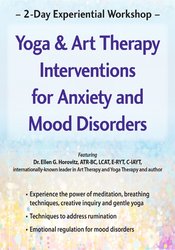
×

Are you feeling challenged or stuck with your clients? Need new ways to help them combat negative self-talk, mood disorders, and physiological challenges?
By combining yoga and art therapy techniques you will discover new and innovative ways to help your clients reduce physiological manifestations and mood disorders and replace rumination with healthy behaviors and thinking.
Watch Ellen, international speaker, author, expert art therapist and yoga therapist, to experience firsthand how to combine creative arts, present moment awareness, yoga, and self-compassion with your clients to calm worried minds and soothe painful emotions.
This exploration, rich in didactic and experiential practice, will teach you how to create a safe container, increase mood regulation in your clients and use specific strategies through:
Open the creative pathway for transformation and learn how to calm your central nervous system through yoga and witness your experience through creative artistic exploration.
You will leave this recording personally restored and confident in your ability to lead your clients towards creative expression, greater peace, transformation and mood regulation.
NOTE: Tuition includes one free CE Certificate (participant will be able to print the certificate of completion after passing the online post-test (80% passing score) and completing the evaluation). Instructional methods will include PowerPoint, didactic lecture, and others.
Continuing Education Information: Listed below are the continuing education credit(s) currently available for this non-interactive self-study package. Program content is reviewed periodically per accrediting board rules for currency and appropriateness for credit. Credit approvals are subject to change. Please note, your licensing board dictates whether self-study is an acceptable form of continuing education, as well as which credit types are acceptable for continuing education hours. Please refer to your licensing board's rules and regulations. If your profession is not listed, please contact your licensing board to determine your continuing education requirements and check for reciprocal approval.
For other credit inquiries not specified below, please contact info@pesi.com or 800-844-8260 before purchase.
Materials that are included in this course may include interventions and modalities that are beyond the authorized practice of your profession. As a licensed professional, you are responsible for reviewing the scope of practice, including activities that are defined in law as beyond the boundaries of practice in accordance with and in compliance with your profession's standards.
For Planning Committee disclosures, please see the statement above. For speaker disclosures, please see the faculty biography.
Earn up to 12.5 CE hours. Please see below, for more details, as credit amounts vary by jurisdiction and profession.
PESI, Inc. is approved by the Canadian Psychological Association to offer continuing education for psychologists. PESI, Inc. maintains responsibility for the program. This program is approved for 12.5 self-study continuing education hours. Full credit statement at: www.pesi.com/cpa-statement
This self-study activity qualifies for 12.5 continuing education clock hours as required by many national, state and local licensing boards and professional organizations. Save your activity advertisement and certificate of completion, and contact your own board or organization for specific requirements.
| File type | File name | Number of pages | |
|---|---|---|---|
| Manual - Yoga & Art Therapy Interventions (54.80 MB) | 119 Pages | Available after Purchase | |
| Instructions for ASHA Credit - SELF STUDY ONLY - 04/29&30/19 (38.5 KB) | Available after Purchase |
Access never expires for this product.
Visit our FAQ page at https://www.pesicanada.com/faq or contact us at https://www.pesicanada.com/contact-us
Mood Disorders
Case studies
Physiological Dysfunction
Case studies:
Satisfaction Guarantee
Your satisfaction is our goal and our guarantee. Concerns should be addressed to info@pesicanada.com.
Please wait ...